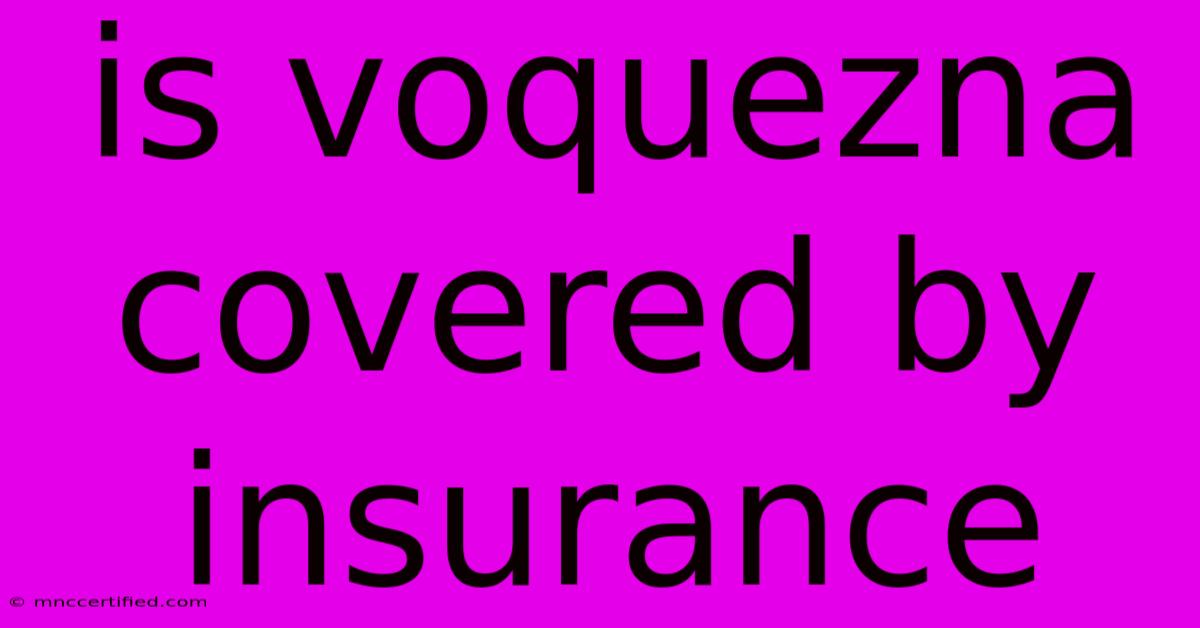Is Voquezna Covered By Insurance

Table of Contents
Is Voquezna Covered by Insurance? A Comprehensive Guide
Finding out if your prescription drug, like Voquezna (vemurafenib), is covered by your insurance can be a complex process. This comprehensive guide will walk you through the steps to determine Voquezna's coverage and offer strategies to navigate potential challenges.
Understanding Voquezna and its Use
Voquezna is a targeted therapy medication primarily used to treat certain types of melanoma, a serious form of skin cancer. It's crucial to understand that insurance coverage depends heavily on factors beyond just the medication itself. Your specific plan, your diagnosis, and even the location of your treatment can all influence whether Voquezna is covered.
Key Factors Affecting Voquezna Insurance Coverage
Several factors determine whether your insurance plan covers Voquezna:
1. Your Insurance Plan:
- Type of Plan: Different insurance plans (PPO, HMO, EPO, etc.) have varying levels of coverage and formularies (lists of covered medications). Some plans might offer greater flexibility in choosing medications, while others might restrict options.
- Tiering: Many plans place medications into tiers based on cost and therapeutic value. Voquezna, as a specialty medication, is likely to fall into a higher tier, meaning higher out-of-pocket costs.
- Prior Authorization (PA): Your insurance company may require a prior authorization before approving Voquezna. This involves your doctor submitting detailed information about your condition and why Voquezna is the necessary treatment. This process can take time.
- Formulary Exclusions: Some plans may explicitly exclude Voquezna from their formulary.
2. Your Diagnosis and Treatment Plan:
- Specific Cancer Type: Voquezna's effectiveness and therefore, coverage, is tied to specific genetic mutations in melanoma. Your oncologist will need to confirm the presence of these mutations for successful prior authorization.
- Treatment Stage: The stage of your melanoma and your overall treatment plan significantly influence insurance coverage decisions.
3. Your Pharmacy and Provider Network:
- In-Network vs. Out-of-Network: Using in-network pharmacies and healthcare providers is generally more cost-effective, as they've negotiated prices with your insurance company.
- Specialty Pharmacies: Voquezna is often dispensed through specialty pharmacies due to its high cost and complex handling requirements. Using an in-network specialty pharmacy is crucial.
How to Determine Voquezna Coverage
Follow these steps to find out if your insurance covers Voquezna:
- Check your insurance plan's formulary: Your insurance company's website usually has a searchable formulary. Search for "vemurafenib" to see if it's covered and what tier it's in.
- Contact your insurance provider directly: Call the customer service number on your insurance card to speak with a representative. Be prepared to provide your policy number and relevant medical information.
- Work with your doctor's office: Your oncologist's office can assist in pre-authorization and navigating the insurance process. They can also provide necessary documentation to support your claim.
- Explore Patient Assistance Programs: If your insurance doesn't fully cover Voquezna, explore patient assistance programs offered by the manufacturer or other organizations. These programs may help reduce your out-of-pocket costs.
Managing the Costs of Voquezna
Even with insurance, Voquezna can be expensive. Consider these strategies:
- Negotiate with your insurance company: If your initial coverage determination isn't favorable, appeal the decision. Provide thorough documentation supporting the necessity of Voquezna.
- Explore financial assistance programs: Many pharmaceutical companies offer patient assistance programs to help offset medication costs. Check the manufacturer's website for details.
- Look into charitable organizations: Several non-profit organizations provide financial aid for cancer treatment.
Conclusion
Determining whether Voquezna is covered by your insurance requires careful investigation. By proactively contacting your insurer, working with your healthcare team, and exploring available financial assistance, you can improve your chances of accessing this vital medication. Remember, persistence and thorough communication are key to navigating this process effectively. Always keep detailed records of all communications and decisions made throughout the process. This will be invaluable should you need to appeal a decision or seek further assistance.

Thank you for visiting our website wich cover about Is Voquezna Covered By Insurance. We hope the information provided has been useful to you. Feel free to contact us if you have any questions or need further assistance. See you next time and dont miss to bookmark.
Featured Posts
-
Announced Coachella 2025 Full Lineup
Nov 21, 2024
-
Reno Diagnostic Center Insurance
Nov 21, 2024
-
Insurance On Apartment Buildings
Nov 21, 2024
-
Finnicum Insurance Magnolia Ohio
Nov 21, 2024
-
Does Insurance Cover Septoplasty
Nov 21, 2024